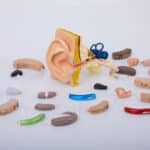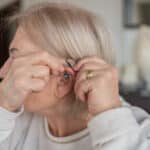Common Questions People Ask About Hearing Aids

If you just got your first hearing test and your specialist recommended treatment for hearing loss, you might have a lot of questions. Let’s look at a few common questions about hearing aids to help clarify the path ahead. 1. Will Hearing Aids Cure Hearing Loss? This is a common question. While hearing aids help…
Don’t Let Hearing Aid Myths Hold You Back

We’ve all heard those common sayings that turn out not to be true. Like “We eat eight spiders a year” or “Hearing aids make you look old.” That first myth, while unnerving to hear, is easy to shake off when you learn it isn’t true. The idea that hearing aids make you look old, however,…
The Link Between Hearing Loss and Balance

Most people are aware that hearing loss can disrupt clear communication and impair background awareness, but fewer understand its impact on balance. How Does Hearing Relate To Balance? Your hearing and balance organs live in the inner ear: How Can Hearing Damage Affect Balance? Because the hearing and balance organs sit so close together, damage…
How To Have Clearer Conversations During Holiday Gatherings

Everybody celebrates Thanksgiving a little differently. Whether you enjoy a meal at Perry’s Steakhouse & Grille or a lively gathering at home, you want every person to feel included in the holiday cheer—regardless of their hearing loss. If you’re planning a larger get-together, here are a few tips to help everyone communicate more easily. 1….
Holiday Shopping With Hearing Loss: Practical Tips for a Stress-Free Experience

The holidays bring plenty of cheer, but also plenty of noise. Between busy crowds, clattering carts, festive music and constant chatter, stores can quickly become an overwhelming listening environment. For the more than 10% of Americans living with hearing loss, that can make what should be a celebratory outing feel more like a challenge. With…
Hearing Aids and Your Beauty Routine

Your beauty routine helps you feel polished and ready for the day. Whether it’s your morning skincare, applying makeup, styling your hair or a weekly manicure and pedicure, these rituals help you look and feel your best. But if you wear hearing aids, it’s just as important to think about their protection. How Can My…
Five Hearing Aid Features You Might Not Know About

Getting hearing aids is an exciting adventure. All hearing aids pick up and amplify sound to help you understand speech, but that isn’t their only perk. While hearing aids differ based on manufacturer and style, each has advanced features to make your life easier. Let’s take a look at five helpful features you might not…
The Connection Between Tinnitus and Mental Well-Being

Hearing a ringing or buzzing in your ear with no identifiable source is a symptom called tinnitus. When tinnitus persists longer than a few minutes, it can interfere with sleep, concentration and emotional health. The Link Between Tinnitus and Mental Health A 2023 study found a strong relationship between tinnitus and mental health challenges such…
How to Clean and Maintain Your Hearing Aids

Properly maintaining your hearing aids not only extends their lifespan but also ensures you’ll always enjoy clear, crisp sound. Here’s a simple guide to keeping your devices in top condition, with tips for at-home care and the benefits of professional cleaning. At-Home Cleaning Tips Regular at-home cleaning is essential to keep your hearing aids working…
Are Hearing Aids a Good Mother’s Day Gift?

Mother’s Day is on May 11th. With that day fast approaching, you’re probably wondering what to give your mom to say thank you for all she’s done for you. Flowers, jewelry, candles and chocolates are at the top of the list for many people. While these are all great options, one more you may not…